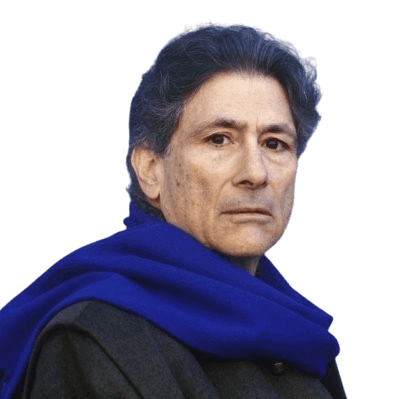Life and achievements
Early life
Edward Wadie Said was born on November 1, 1935, in Jerusalem to a privileged Christian Palestinian family. His father, Wadie Said, was a successful businessman who became a U.S. citizen while serving in the American army during World War I. The Said family fled to Egypt after the creation of Israel in 1948, marking the beginning of Edward Said’s lifelong experience with exile.
Said’s early education took place at St. George's School in Jerusalem and Victoria College in Cairo. He often felt out of place in these environments and developed a deep sense of alienation, which became a recurring theme in his life and work. Later, he attended Northfield Mount Hermon School in Massachusetts, excelling academically, before pursuing higher education at Princeton University and Harvard University, where he completed a Ph.D. in English Literature.
These formative experiences—growing up in a displaced, multicultural environment and feeling a strong sense of otherness—deeply shaped Said’s intellectual and political development. They informed his later work on imperialism, Orientalism, and his advocacy for Palestinian self-determination.
Legacy
Edward Said’s contributions to scholarship as a public intellectual remain pivotal in postcolonial studies, literary criticism, and Middle Eastern politics. His book Orientalism is regarded as one of the most influential works of the twentieth century. It fundamentally changed how scholars viewed the relationship between the West and the East, exposing how Western representations of the “Orient” were deeply intertwined with colonial domination. Orientalism not only transformed humanities disciplines but also became a political text for those resisting colonial and neocolonial powers.
In addition to his academic work, Said was an ardent advocate for Palestinian rights. His political essays, particularly The Question of Palestine, presented a nuanced and humanistic perspective on the Israeli-Palestinian conflict. Despite receiving threats for his outspoken support for Palestine, Said remained committed to advocating for justice and fairness for all involved parties.
Said’s influence extended beyond politics and postcolonialism; he was also a cultural critic and music enthusiast. His collaboration with Daniel Barenboim in establishing the West-Eastern Divan Orchestra demonstrated his belief in culture’s power to bridge political divides. The orchestra, which brings together young Israeli and Arab musicians, remains a lasting testament to Said’s commitment to dialogue and understanding through art.
Said’s legacy is global. His ideas continue to inspire scholars, activists, and intellectuals who fight for justice, decolonization, and critical engagement with power. His critiques of imperialism, culture, and representation remain relevant to understanding contemporary global issues, from media portrayals of the Middle East to ongoing struggles for political sovereignty.
Milestone moments
Jan 1, 1978
Publication of Orientalism
Orientalism was published in 1978, revolutionizing the fields of postcolonialism, literary criticism, and cultural studies.
The book critiqued how the West portrayed the “Orient” as backward and inferior, revealing these depictions as part of colonial power structures.
Orientalism became a widely read academic text, influencing discussions on representation, imperialism, and knowledge production.
This publication established Said as one of the leading intellectuals of his time and opened up new conversations about the power dynamics of cultural representation.
Oct 15, 1979
Publication of The Question of Palestine
In 1979, Said published The Question of Palestine, offering a thorough critique of the Israeli occupation and advocating for Palestinian self-determination.
The book presented the Palestinian perspective on the conflict, linking the issue to broader themes of imperialism and injustice.
Said’s recognition of both Jewish historical rights and Palestinian rights to the land earned him both praise and criticism.
This book cemented Said’s role as a leading voice in the Israeli-Palestinian conflict, transitioning him from an academic to a public intellectual.
Jul 24, 1991
Critique of the Oslo Accords
In 1991, Said publicly condemned the Oslo Accords, arguing that they failed to address critical Palestinian concerns, particularly the right of return for refugees.
He viewed the accords as a capitulation by Palestinian leadership, claiming they compromised Palestinian sovereignty and statehood.
Said’s critique proved prescient, as many issues he raised, such as the expansion of Israeli settlements, continue to be significant challenges today.
This milestone demonstrated Said’s willingness to challenge both Israeli and Palestinian leadership when he believed principles of justice were being compromised.
Mar 21, 1999
Co-Founding of the West-Eastern Divan Orchestra
In 1999, Said and Israeli conductor Daniel Barenboim co-founded the West-Eastern Divan Orchestra, bringing together young Arab and Israeli musicians.
The orchestra aimed to promote dialogue and understanding between Israelis and Arabs through the universal language of music.
Said believed that art and culture could help bridge political divides, and this project embodied his belief in cultural dialogue as a path to peace.
This initiative highlighted Said’s lifelong commitment to using culture as a tool for creating understanding and overcoming political barriers.
